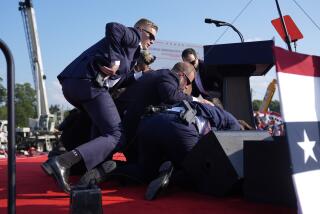On Trip to Iowa, Bush Mixes Politics, Policy, Fund-Raising
- Share via
DES MOINES — In the midst of the American heartland, far from the feared target of an attack, President Bush said Friday that concerns about a nuclear strike by terrorists were behind the continuing operation of a “shadow government” ready to take over if Washington is destroyed.
“Until this country has routed out terrorists wherever they try to hide, we’re not safe,” Bush said on a trip to Iowa that mixed policy and politics.
The administration confirmed Friday that shifting teams of senior government officials were living and working at two different, secure locations along the East Coast, ready to take over in the event of a catastrophic attack on the nation’s capital.
The plan was put into place after the Sept. 11 terrorist attacks on the World Trade Center and the Pentagon.
“We take the continuity-of-government issue very seriously because our nation was under attack,” Bush said. “And I still take the threats that we receive from Al Qaeda killers and terrorists very seriously.”
Despite the U.S. efforts to disrupt Al Qaeda, the terrorist network that had been based in Afghanistan and is run by Osama bin Laden, the organization’s capabilities remain unclear. U.S. officials remain concerned that Al Qaeda might obtain a portable nuclear weapon, sources said.
U.S. intelligence has no specific knowledge that the network has such a weapon, but the risk was great enough to warrant the activation of the plan, which dates to the Eisenhower administration, said a senior government official who spoke on condition of anonymity.
In Support of Private Retirement Accounts
Bush made his comments after he ended a discussion with workers at a printing company in Des Moines. That meeting and a subsequent speech at the plant were to draw attention to Bush’s proposal in the wake of the Enron Corp. scandal to protect workers’ pensions and other retirement funds.
He also reiterated his support for plans that would allow Americans to invest some of their Social Security taxes in personal retirement accounts, guided by personal financial advisors.
“You ought to be trusted with your own money,” Bush said.
Later, he spoke at a luncheon expected to raise almost $500,000 for the Iowa Republican Party and the reelection campaign of Rep. Tom Latham, mixing politics with official business on his fourth visit to the state as president. Iowa is a key state in the presidential nomination process and in the general election.
Bush also responded to remarks Thursday by Senate Majority Leader Tom Daschle (D-S.D.) that focused renewed attention on the failure so far of U.S. troops to account for Bin Laden and Mullah Mohammed Omar, the Taliban leader whose forces were routed in the U.S. attacks on Afghanistan.
Daschle had said, “Clearly, we’ve got to find Mohammed Omar, we’ve got to find Osama bin Laden and we’ve got to find other key leaders of the Al Qaeda network or we will have failed.”
A Daschle spokeswoman later said the senator’s remarks should not be construed as critical of Bush or the anti-terrorism campaign. However, they gave voice to an undercurrent of questions about the fate of the terrorist leaders, what threat they continue to pose to the United States and whether the White House was expanding the military campaign without a clear explanation of its aims. Comments by other Democrats also have raised questions about the Senate’s willingness to support the large increase in defense spending Bush is seeking.
Time on Our Side, Bush Assures Audience
“I think most Americans understand that it’s going to take a while to achieve all our objectives,” Bush said. “And by far the vast majority of Americans are patient. They know when you’re looking for one person, who may be hiding in a cave, it may take a while.
“But what Osama bin Laden’s got to understand . . . [is] that this patient and determined nation is going to hunt him down. He can’t hide long.”
Daschle’s remarks earned him rebukes from congressional Republicans, who suggested that such comments could undermine the U.S. war effort.
Asked Friday about the GOP reaction, Daschle said, “I think the Republicans’ reaction is nothing short of hysterical. I’m amused, frankly. . . . The Congress has a constitutional responsibility to ask questions. We are not a rubber stamp to this president or to anybody else.”
Under the shadow government plan Bush discussed, 75 to 150 senior government officials, drawn from every Cabinet department and some independent agencies, work in secret out of two fortified locations.
They rotate in and out of the facilities, prohibited from telling anybody where they are or why. Friends, family and co-workers can reach them through a toll-free number and personal extensions.
A variation of the plan was first devised at the height of the Cold War under President Eisenhower nearly half a century ago.
Bush said his administration activated the new version of the plan to ensure that “should somebody be successful in attacking Washington, D.C., there’s an ongoing government.”
That, he said, was one of the reasons Vice President Dick Cheney periodically has been sent to secure, undisclosed locations since the Sept. 11 attacks.
“This is serious business, and we take it seriously,” Bush said.
He said that, as a result of the precautions taken after Sept. 11, “we’ve made America a tougher place to attack than before.
“It is much harder for somebody to get on an airplane to attack again. We’ve got better intelligence-gathering. We’re doing everything in our power to protect the American people.”
*
Times staff writer Nick Anderson in Washington contributed to this report.
More to Read
Sign up for Essential California
The most important California stories and recommendations in your inbox every morning.
You may occasionally receive promotional content from the Los Angeles Times.













